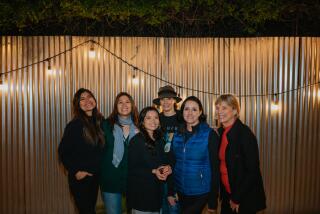Women Entrepreneurs Helped by World Bank Group : Business: Through counseling and loans, the nonprofit organization has helped 250,000 to start their own companies.
- Share via
NEW YORK — For Gail Edwards, getting down to business means roving the central Maine countryside with her four young children in search of wild herbs and flowers to blend into natural teas and tonics.
Annual sales of her homemade potions amounted to a measly $200 last year. But next spring, Edwards expects to sell $20,000 worth of products, thanks to a $5,000 loan secured with the help of Women’s World Banking.
The nonprofit group has helped at least 250,000 women worldwide get started in business over the past decade through counseling or loans.
“It brought my business from essentially a dream into a thriving business,” said the 41-year-old Edwards, a single mother who had little hope of getting a bank loan before Women’s World Banking’s Maine affiliate took up her cause.
Although it pales in size to other global lending institutions, the New York-based group has had a profound economic--and political--impact in clearing the way for many businesswomen.
In Thailand, the group helped 100 women start a dairy cooperative by helping them get loans totaling $1 million. And the group’s affiliate in India has grown into an active savings and loan program for about 60,000 women--many of them from the lowly regarded untouchable caste.
Thanks to negotiations by the group, the governments of Japan and Kenya have stricken regulations that required women to have their loans guaranteed by their husbands or fathers.
“In most countries of Latin America and Asia, the cultural barrier has been broken,” said group President Nancy Barry.
Ironically, the United States is the final frontier for the global organization, she said.
Focusing on developing countries since its inception 10 years ago, the group’s five U.S. affiliates thus far have the power only to help women draw up business plans, write loan applications and suggest alternate funding routes. But before the end of the year, at least one branch--the Akron, Ohio, affiliate--expects to start guaranteeing bank loans like its overseas counterparts.
It’s a significant step. Despite notions of the United States as progressive in women’s rights, old ways sometimes die hard in the nation’s predominantly male lending industry.
“Credit isn’t without bias, which is different than discrimination,” said Barbara Lange, executive director of the Women’s Entrepreneurial Growth Organization, the Akron branch. “A part of the lending process has to do with the comfort level of the banking officer.”
When physical therapist Claudia Miller set out last year to get a loan to start her own practice in Akron, for example, the single woman had no idea that her marital status would become a liability. But the bank’s loan officer essentially ignored the financial case she had built and instead insisted on checking out the income level of her part-time partner’s husband.
Miller, 42, decided to seek an alternative method of funding. Working with WEGO--not yet set up to guarantee loans--Miller developed a cohesive business plan that led to a creative alternative. Instead of buying the $75,000 worth of high-tech business equipment that her practice required, Miller agreed to lease it with an option to buy later.
Such creativity is repeated throughout the 40 countries in which Women’s World Banking has branches.
In the case of Edwards, the potion purveyor, Women’s World Banking helped her write a business plan that convinced a local economic development agency to loan her $5,334. She spent the money on newspaper advertisements, a 12-page mail-order catalogue and spiffy packaging.
Her business plan already has shown positive results. Edwards said she was working 16-hour days to meet the surge in requests for her wild-gathered potions of comfrey, colts foot and other medicinal herbs.
And this fall, the West Athens, Me., woman was able to achieve a nearly twentyfold jump in sales from the previous year--a windfall since her only other source of income was food stamps and $80 a month in child support.
With her newfound income, Edwards hopes to turn an outside shed into a new drying area for her herbs.
Barry, the Women’s World Banking president, said women generally are good loan risks because they “tend to be very practical and have their feet on the ground,” know how to “juggle a lot of balls at a time,” and are “balanced with a sense of the possible.”
“All of those skills are precisely what it takes to make a small business work,” explained Barry, 41, a former World Bank employee who pioneered that group’s projects in small-business development in 1975.
More to Read
Inside the business of entertainment
The Wide Shot brings you news, analysis and insights on everything from streaming wars to production — and what it all means for the future.
You may occasionally receive promotional content from the Los Angeles Times.










